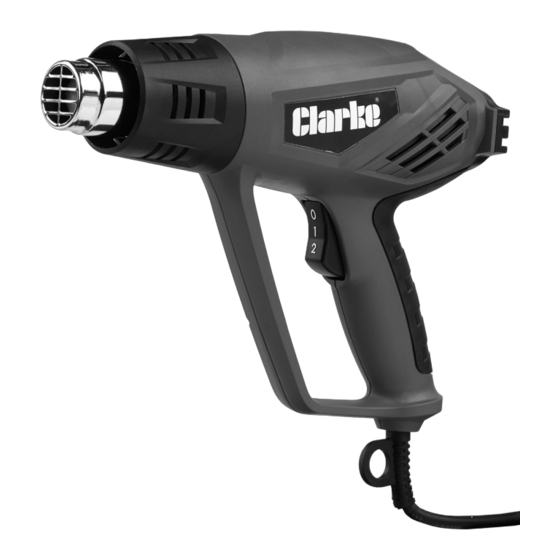Clarke CHG2000C Instruções para o utilizador - Página 8
Procurar online ou descarregar pdf Instruções para o utilizador para Ferramenta eléctrica Clarke CHG2000C. Clarke CHG2000C 13 páginas. Hot air gun

OPERATION
Before starting work it is recommended that you heat a test piece to ensure
you have the correct heat setting. In addition you should always take steps to
protect sensitive or delicate areas where the effect of heat could cause
damage (i.e. glass and plastics). Do not apply heat to the same place for a
long time.
After the work has been completed, switch the gun off, disconnect from the
mains supply and allow to cool in a safe place.
Take care not to drop the gun as this could damage the heating element.
To prevent the gun from overheating, maintain a minimum distance of 3 cm
between the end of the nozzle and the work piece.
REMOVING PAINT AND DISSOLVING ADHESIVES
1. Fit the nozzle to the front of the gun.
2. With the switch in the '0' (OFF) position plug the gun into the mains supply.
3. Set the switch to either position 1
or 2 according to how much heat
is required. (see Specification).
• Ensure the nozzle is pointing
away from you.
4. Bring the nozzle of the hot air gun
to the work piece approximately 3
cm from the surface.
• The exact distance between
the nozzle and the work piece
will be dependent on the material being worked on.
• Paint will rapidly become soft and blister, at which point it can be
removed with the triangular shave hook. Do not allow paint to burn
as this will make the removal process more difficult.
• Most adhesives dissolve when heated and these can then be
removed, taking care that any parts from which glue is removed are
heat resistant.
• Heating and paint removal are performed simultaneously, with the
shave hook following the hot air gun.
5. Clean the shavehook blade quickly if paint/glue becomes stuck to it.
• Profiled parts may be cleaned with a suitable wire brush once paint
is softened.
Parts & Service: 020 8988 7400 / E-mail: [email protected] or [email protected]
8
